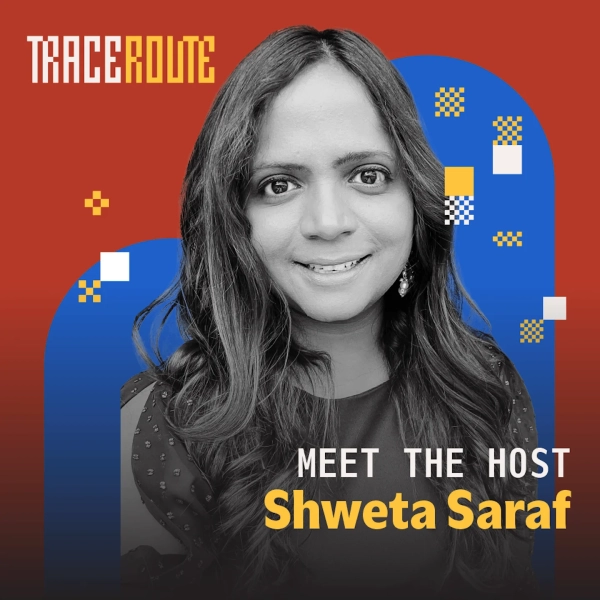Grace discusses one of the central themes of Season 2: “the humanity in the hardware,” and how this is different from Season 1 while Amy Tobey explains her role as a “socio-technical engineer.” Grace talks about Amy’s role in terms of a country music album, as Amy goes into her background as a car engine enthusiast.After looking back at Equinix founder Jay Adelson’s memory of the beginning of telecom, Amy shares her wish that tech could move into more science fiction realms - what are the future limits of physics going to be? Finally, Amy & Grace conclude with a few ideas: are we limited only by the power of the pieces of the stack? Has “stack diversity” increased over the last decade?
Amy Tobey:
What we've gotten out of the internet and the changes to our society and to our lives is greater than the sum of all the parts of all this stuff. To me, the future of the stack is getting more of that, right? We have so much available to us today. No two people really even understand the same stack of technology. But what's really cool is is because of this diversity that has sprung up in the last decade, we're seeing things that are more than the sum of the parts, and that's the stuff that's really exciting.
Grace Ewura-Esi:
You're listening to Traceroute, a podcast about the inner workings of our digital world. For Equinix, I'm Grace Ewura-Esi. In season one of Traceroute, we took an in-depth look at the history of the infrastructure of the internet. What we really want to explore now with Traceroute is what we're calling the human layer of the stack. We're going to do that by finding the humanity within the hardware, and we're going to share those personal and moving stories of the people who continue to shape our current and future digital world. Before we get there, we're really excited to present a preview of what's to come in future episodes. In each one of these minisodes, we'll get to meet one of my new co-hosts, each one an expert in their technical field and uniquely qualified to bring a really human perspective to the stories that we'll be sharing with you.
Amy Tobey:
I'm Amy Tobey, senior principal engineer at Equinix. What I do is sociotechnical engineering. I work with teams all across the company to help them improve their reliability, security, and learn practices of resilience. I've worked in this field for more than 20 years at companies of every size, from kernel drivers and hardware all the way up to user interfaces and web applications. I got my start working on MUDs, which are multi-user dungeons and ultimately wanted to modify them, so I went and found a book called C Unleashed. As I was learning it, I ran into difficulties with the environment I was using. Eventually, people told me to go and try Linux, and then the rest is basically history at this point.
Grace Ewura-Esi:
I've been thinking a lot about some of our past conversations. I feel like if I were to name your debut country album, I would call it the Tinkerer, Trash and Treasure. What do you think? Is that good?
Amy Tobey:
I'm not like the biggest country fan, but it's definitely a country album. You nailed it.
Grace Ewura-Esi:
Okay, so if that's the name of the album, what is the signature track on that album and what's it about?
Amy Tobey:
Maybe it's going to be something like a love affair with a broken machine.
Grace Ewura-Esi:
Oh, yes!
Amy Tobey:
I grew up just below a middle class, so we didn't have a lot of money for me to own cars. Until later in my career, I didn't have a lot of money for cars either. I had this trick. Because I had grown up working on them, I would go to the local dealers and look around the back of the lot, the very, very back, off of the pavement, in the dirt. There's sometimes a couple of cars parked in the back and there's something wrong with them. What I do is go up to the car dealer and be like, "How much to get that out of your way?" It'd usually be an answer like, "$300. You tow it out of here and it's yours." Then I buy them and I take them home, figure out what was wrong, get the parts and fix it, and then drive it for a couple of years. It's like this thing that's been a theme in my life is finding these broken things and bringing them back into some kind of operation. And then probably as you noted earlier, tinkering endlessly. And then eventually I'll get bored with it and move on with cars. That's probably the ballad is like my love affair with broken things.
Grace Ewura-Esi:
I'm so excited that you are one of the co-hosts of this season. In season one, we were covering a lot of topics, essentially the history of the digital age as we know it today. I wonder what were some of your main takeaways or what did you wish we would've talked about a little bit more from that first season?
Amy Tobey:
What we've gotten out of the internet and the changes to our society and into our lives is greater than the sum of all the parts of all this stuff. There's a bunch of stories in there and there's a bunch of magic, literally in some cases, where things come together, these complex systems, and somehow they work against all expectations. That to me is where the surprise is, where the delight is, a little bit past the mechanics and into how it all comes together in our lives.
Grace Ewura-Esi:
I love that use of that word delight because my biggest takeaway from season one is this is pure sorcery. Season one was just a really good reminder of that interconnectivity inside of all the parts that make up technology as we know it. In episode one, Jay Adelson talked about the beginning of telecom and how that really birthed a lot of the internet as we know today.
Jay Adelson:
The idea at the time was to basically hand the reins of the internet off to the top five largest telephone companies at the time. And if you wanted to connect to anyone else, you would have to pay them to connect to them. Now, this probably made sense at the time because telephone companies weren't officially in the internet business. But as soon as the internet started to get exciting in '95 and '96, they started selling internet services. It would be like an airport was owned by an airline and then charged a tax to their competitors to come land at their airport.
Grace Ewura-Esi:
What I kept thinking was, okay, but where's the beginning of telecommunications? Should we have started with the story of two cans and a string, or is that an oversimplification of where the story actually began? How far back can we go to still connect to where we are now?
Amy Tobey:
I think we have to go pretty far back to where the records available to us literally don't exist. I think probably pre-writing stuff that we don't really think about anymore, but is really a precursor to everything we're doing right now in this podcast and in this life of interconnection.
Grace Ewura-Esi:
It makes me think, what are some of the conversations of the future?
Amy Tobey:
When I think about what I want from the future, the thing that I think I desire the most, at least from the technological perspective, is something that looks a little bit more like a lot of science fiction, to be honest. I would like to talk a little bit, especially with that connection from our past to what does it look like when we have technologies that let us speak without the latency that we have today. Grace and I are currently by light speed 40 or 50 milliseconds apart from each other, so we couldn't really sing a song together on this medium because it wouldn't match. That would be something I would really like to see is a world where we can get on a Zoom and sing and still match each other and still hear the resonances, right? I wonder if that's possible. What are the future limits of physics going to be?
Grace Ewura-Esi:
Yeah, I like that get together and sing. We are actually only limited by the power of the pieces, right? If we can refine that stack, we can refine how we communicate or what we can build.
Amy Tobey:
And that's the thing about stacks or groups of people that fascinates me the most. We have so much available to us today. No two companies, no two people really even understand the same stack of technology. But what's really cool is, is because of this diversity that has sprung up especially in the last decade, we're now starting to see new forms of stack, new application areas. This is always ongoing, but what fascinates me is we're seeing things that are more than the sum of the parts. And that's the stuff that's really exciting.
Grace Ewura-Esi:
Oh, I love that. The kinds of topics we're going to be talking about this season with you, Amy, are really in line with this idea of taking old parts and finding the treasure and the places for improvement to then fix them up and put them back inside the system. It really speaks to how you work and how your experience is going to be showing up in this season. Amy, we're going to have so much fun this season. There may or may not be a recording of an album that I get to be featured on.
Amy Tobey:
I'm holding you to a duet track.
Grace Ewura-Esi:
Okay, hold up. What's our duet about? I need details.
Amy Tobey:
I hadn't thought that far ahead. Grace Ewura-Esi: I feel like if you're the tinkerer, what would I be? I've always said that I feel like I knit things together, so maybe it's something about interconnectivity.
Amy Tobey:
What jumps to my mind is the tinkerer and the philosopher.
Grace Ewura-Esi:
Be still my heart. I love it. I'm ready whenever you're ready to lay down that track. I love country music, so I am on board with whatever song that we'll be singing sweetly together, but I guess I'm Grace Ewura-Esi, the philosopher.
Amy Tobey:
And I'm Amy Tobey, the Tinkerer
Grace Ewura-Esi:
Traceroute is a podcast about the inner workings of our digital world from Equinix, the world's digital infrastructure company. If you'd like to take a deeper dive, check out origins.dev for an up close and personal look at our digital world through Creative Lens. You can search Equinix Developers on YouTube for developer led livestreamed technical content.
We also invite you to join our conversation on Twitter by following our account at @origins_ dev. Links are in the show notes. Traceroute is a production of Stories Bureau. This episode was produced by Mathr de Leon and John Taylor. It was edited by Joshua Ramsey with additional editing by Janelle Monique. It was mixed by Jeremy Tuttle, and Tim Balint with music supervision by Gabe Schatz. Our theme song was composed by Ty Gibbons. Be sure to subscribe on Apple, Spotify, or wherever you get your podcasts. If you've enjoyed the show, we'd appreciate your ratings and reviews. I'm Grace Ewura-Esi. Thanks for listening.

